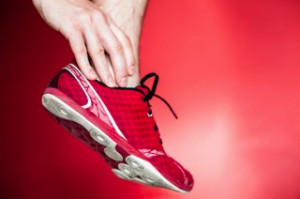
Studies show that ankle sprains are the most common injury experienced among runners. Additionally, if you have experienced an ankle sprain in the past, you are 75 percent more likely to develop chronic ankle instability. As a result, choosing the right running shoe is of paramount importance to avoid these outcomes. First, opt for shoes with a high-top design or added ankle padding. These features can help stabilize the ankle joint and reduce the risk of sprains and strains during your runs. Additionally, a snug and secure fit around the ankle area, particularly at the heel, is essential. Look for shoes with padded collars and lacing systems that allow you to adjust the tightness to your comfort level. Cushioning is another key factor in finding shoes with adequate ankle support. Shoes with ample cushioning in the heel and midsole provide shock absorption, which helps minimize the impact on the ankles. Further, choose running shoes with a durable outsole that offers excellent traction, ensuring a stable and confident stride. Finally, take into account the type of terrain you typically run on when deciding on the right shoes. For more information on protecting your ankles while running, it is suggested that you make an appointment with a podiatrist.
If you are a runner, wearing the right running shoe is essential. For more information, contact one of our podiatrists from Summit Podiatry. Our doctors can provide the care you need to keep you pain-free and on your feet.
Choosing the Right Running Shoe for Your Foot Type
To increase performance and avoid the risk of injury, it is important to choose the right running shoe based on your foot type. The general design of running shoes revolves around pronation, which is how the ankle rolls from outside to inside when the foot strikes the ground.
- Neutral runners are able to choose from a wide variety of shoes, including minimalist shoes or even going barefoot.
- Runners who overpronate, or experience an over-abundance of ankle rolling, should choose shoes that provide extra motion control and stability.
- Runners who underpronate, or supinate, have feet that have high arches and lack flexibility, preventing shock absorption. They require shoes with more flexibility and cushion.
If you have any questions please feel free to contact one of our offices located in Wilmington, Whiteville, and Wallace, NC . We offer the newest diagnostic and treatment technologies for all your foot and ankle needs.
